US Companies Forge Ahead with Syria Energy Plan After Sanctions Relief

A coalition of US-based firms, including Baker Hughes, Hunt Energy, and Argent LNG, is set to develop a comprehensive masterplan for Syria's oil, gas, and power sector. This move follows the lifting of most US sanctions on Syria by President Donald Trump at the end of June, paving the way for American companies to re-engage with the war-torn nation.
Argent LNG Leads the Charge to Rebuild Syrian Energy Infrastructure

Jonathan Bass, CEO of Argent LNG, confirmed the partnership, highlighting the group's aim to rebuild Syria's severely damaged energy infrastructure. Argent LNG, which is developing an LNG export facility in Louisiana, will lead the consortium.
High-Level Meetings Held in Damascus Amidst Ongoing Tensions

Executives from Argent LNG, Hunt Energy, and Baker Hughes arrived in Damascus on July 17th for meetings with Syrian Finance Minister Yisr Barnieh. The meeting took place amidst a backdrop of heightened tensions, as Israeli airstrikes targeted Damascus during the same period.
Syrian Finance Minister Signals Growing Interest from US Investors

Following the meetings, Syrian Finance Minister Yisr Barnieh posted on LinkedIn, noting the visit signaled "growing interest among American companies and investors in engaging with Syria." This statement underscores the Syrian government's efforts to attract foreign investment and rebuild its economy.
US-Negotiated Ceasefire Announced Amidst Renewed Clashes

Adding to the complexities of the situation, a US-negotiated ceasefire between Israel and Syria was announced on July 19th. This occurred amidst renewed clashes in Syria's Druze heartland, which had prompted the Israeli strikes on Damascus, highlighting the fragile security environment in the region.
Trump's Policy Shift: Lifting Sanctions and Encouraging Engagement

The recent developments are a direct result of President Donald Trump's decision to lift most US sanctions on Syria, a move announced in May 2025 and formalized at the end of June. This policy shift represents a significant departure from years of US isolation of the Syrian regime.
Gibson Dunn Analysis Highlights Opportunities for US Companies

Following the lifting of sanctions, Gibson Dunn published an alert on July 11, 2025, detailing the implications for US companies. The firm noted that the move allows US persons and companies to explore commercial re-engagement, particularly in previously restricted sectors like energy.
Syria's Devastated Energy Sector: A Need for Massive Investment

The Syrian civil war has had a catastrophic impact on the country's energy sector. Electricity production has plummeted from 9.5 gigawatts (GW) before 2011 to a mere 1.6 GW currently. Billions of dollars in investment are needed to repair and rebuild the infrastructure. The Syrian Ministry of Energy estimates that repairs to the electricity sector alone could cost $5.5 billion.
Key Players: US Firms, Syrian Government, and International Actors
The key players involved in this initiative include Argent LNG, Baker Hughes, and Hunt Energy on the US side, and the Syrian government led by Ahmed al-Sharaa. Other international actors with stakes in Syria's energy sector include Gulf Arab states like Qatar, Turkey, the EU, Russia, and Iran.
Statements from Key Figures Emphasize Commitment to Rebuilding

Jonathan Bass, CEO of Argent LNG, stated, "We are initiating the development of a comprehensive masterplan for energy and power generation in Syria, based on a preliminary assessment of opportunities for near-term improvements in generation capacity and service delivery." This statement reflects the commitment of US firms to play a role in rebuilding Syria's energy infrastructure.
The Division of Syria: Implications for Energy Development
The focus on areas west of the Euphrates, under Syrian government control, highlights the ongoing division of Syria. The oil-rich east remains largely under the control of the Syrian Democratic Forces (SDF), a US-backed, Kurdish-led armed group. The long-term implications of this division for energy development and resource control remain to be seen.
Geopolitical Ramifications: A Potential Shift in Regional Alliances
This development signals a potential shift in regional alliances and influences, with the US, Turkey, and Gulf states seemingly aligning on certain aspects of Syria's future. The engagement of US firms and the lifting of sanctions mark a significant shift in US policy towards Syria after years of isolation, prompting varied reactions from international and regional actors. Israel, for instance, has expressed concerns about the new Syrian leadership and recently conducted airstrikes on Damascus.